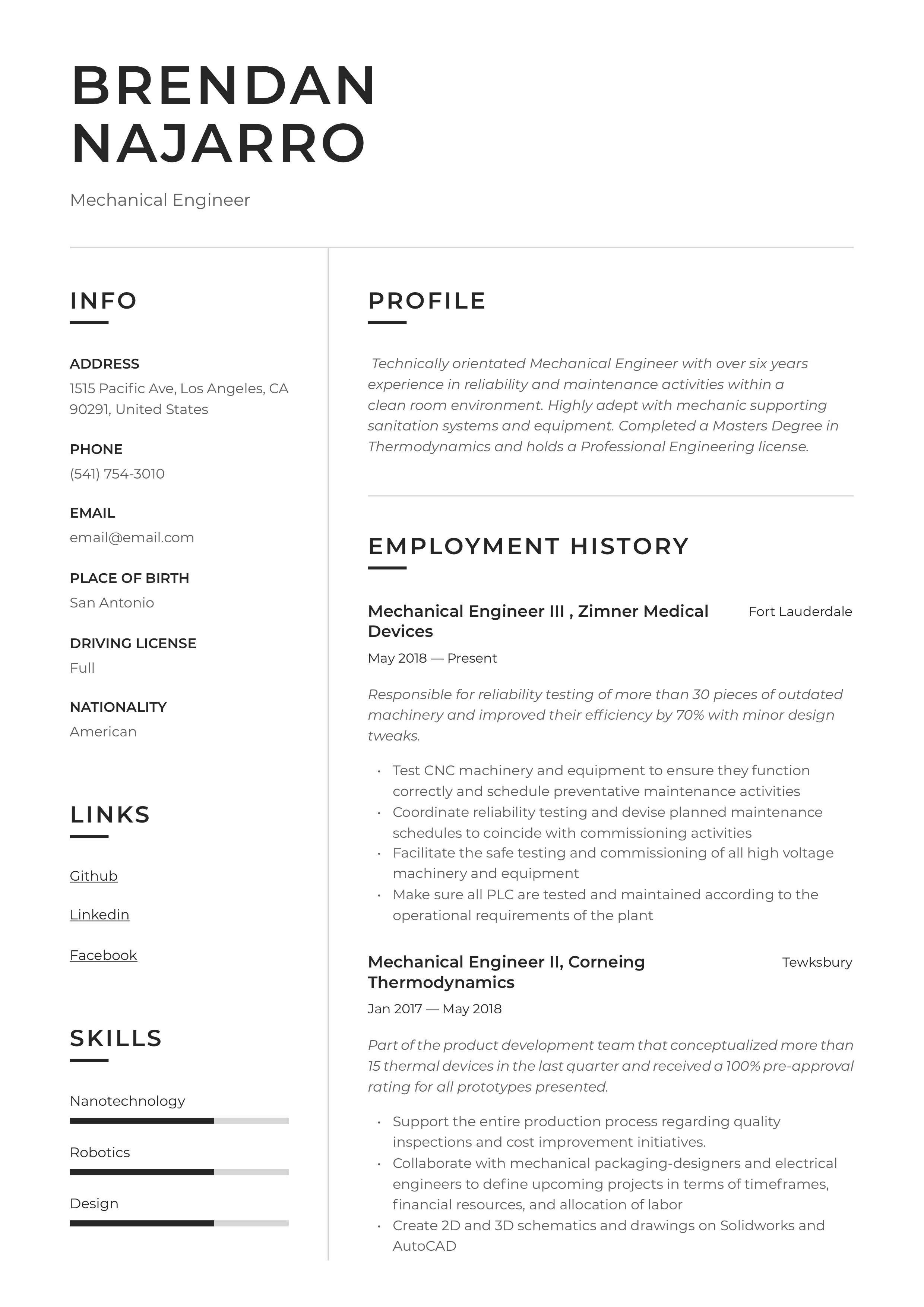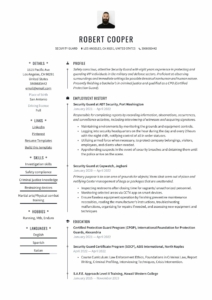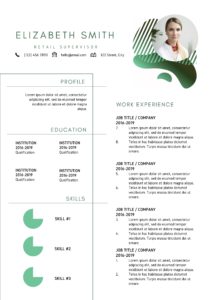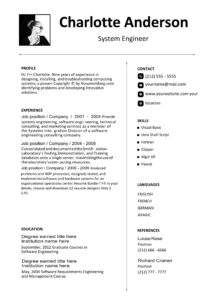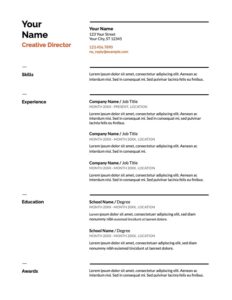What you can read in this article
Mechanical Engineer Resume Samples
(Free sample downloads are at the bottom of this page!)
Mechanical Engineer Resume Summary & Objectives
A career summary is a tool that serves a very specific purpose: to instantly communicate your potential value and proven capabilities to a prospective hiring manager. This ‘’personal branding statement’’ should be less about what you want out of your career (leave that for the interview) and more about your fit for the role.
A few dos and don'ts to remember:
- To mimic the language in the job offer
- Don’t use jargon
- Do spell out names in full
- Don’t use too many descriptive nouns
Considering that you are a Mechanical Engineer approach the compilation of your summary like you would approach a project….in stages.
- Stage 1: Lead with a compelling personal trait/verb and then job title
- Stage 2: Provide years of experience by a number
- Stage 3: State the primary purpose of your job, integrated with two special competencies (or outstanding qualities)
- Stage 4: List the highest degree, certification or qualification attained
- Stage 5: Now time yourself while reading the script out loud (should be less than 30 seconds)
Examples:
Meticulously organized junior Mechanical Engineer with a head for data assimilation and research methodologies to spearhead innovative product design and development. Skilled in machine and firmware coding with a strong theoretical foundation in engineering mechanics of adhesive bonding, brazing, soldering, and welding materials. Currently pursuing the Fundamentals of Engineering Exam.
Technically orientated Mechanical Engineer with over six years of experience in reliability and maintenance activities within a clean room environment. Highly adept with mechanics supporting sanitation systems and equipment. Completed a Masters's Degree in Thermodynamics and holds a Professional Engineering
license.
Accomplished, project-focused Mechanical Engineer with more than twelve years of experience in program and project management from prototype to commercialization and a guru in Stage-Gate. Recognized for valuable contributions in product improvements and efficiencies, resulting in a 90% FDA approval rate for the company. Certified Project Management Professional with uninterrupted Professional Engineer status.
Mechanical Engineer Job Descriptions & Examples
The career progression of a Mechanical Engineer is depicted by various stages, which provides standardization to job titles and experience levels
A Mechanical Engineer Stage I (0-2 Years’ Experience) may:
- Design product concepts, build prototypes and conduct testing and validation on Class I medical devices
- Establish ongoing relationships with potential overseas private equity firms to secure funding for commercialization of pilot products
- Interact with potential manufacturers and create proposals to set up assembly lines, packaging requirements and production specifications
- Define product specifications, wrote inspection and testing manuals and draft failure analysis reports
- Propose design improvements and redesign suggestions to the product development team to correct problems with prototypes
A Mechanical Engineer Stage II (2-4 Years’ Experience) may:
- Support the entire production process regarding quality inspections and cost improvement initiatives.
- Collaborate with mechanical packaging-designers and electrical engineers to define upcoming projects in terms of timeframes, financial resources, and allocation of labor
- Create 2D and 3D schematics and drawings on Solidworks and AutoCAD
- Monitor project progress, record test results, write quality reports and submit to senior engineer for final approval
A Mechanical Engineer Stage III (4-7 Years’ Experience) may:
- Test CNC machinery and equipment to ensure they function correctly and schedule preventative maintenance activities
- Coordinate reliability testing and devise planned maintenance schedules to coincide with commissioning activities
- Facilitate the safe testing and commissioning of all high voltage machinery and equipment
- Make sure all PLC are tested and maintained according to the operational requirements of the plant
A Mechanical Engineer Stage IV (7-10 Years’ Experience ) may:
- Drive Cost Reduction Project to reduce materials expenditure by thirty percent over eighteen months to save over $2 million on current and new products.
- Personally resolve all DFM, DFA and quality issues with OEM / ODM contract manufacturers and renegotiated service level agreements and delivery schedules with suppliers
- Mentor junior engineers on processes and procedures of lean manufacturing technologies applied to the entire product life cycle stages of all prototypes and pilot products
- Approve new design and drawing reviews, tolerance analysis (GD&T) and packaging proposals
A Mechanical Engineer Stage V (10 Years’ and beyond) may:
- In charge of the entire production plant including operations, quality control and plant maintenance activities
- Manage daily workloads of the quality engineers, and mechanical engineering team
- Ensure timely completion of start-up and commissioning processes for two semiconductor operations
- Provide leadership to coordinate design, development and commission projects
(You can create a resume with the building tool, and download unlimited, different designs!)
Highlight Your Accomplishments
A Mechanical Engineering resume can get very technical, and you do not want to overwhelm recruiters and hiring managers with so much detail that the most significant features of your experience get lost in terminologies.
An accomplishment section will help to draw their attention to your potential value add regarding the position. Candidates are sometimes confused about what to include in an accomplishment section. In short, brag, boast and sell yourself by including the projects you are most proud of, where you were commended for your contribution by your superiors, and of course where you added value to the bottom line by either saving costs or making money.
Examples:
- Part of the product development team that conceptualized more than 15 thermal devices in the last quarter and received a 100% pre-approval rating for all prototypes presented
- Automated the product specification reports which resulted in the lead time from specification to prototype design decreasing by six weeks on average
- Attained a 50% reduction in maintenance expenses with a rollout of a routine preventative maintenance program for all production equipment at the facility
- Improved the undisrupted equipment reliability by adding two extra planned maintenance schedules per quarter resulting in zero shutdowns due to machine failures in the last 12 months
- Responsible for reliability testing of more than 30 pieces of outdated machinery and improved their efficiency by 70% with minor design tweaks
There are two golden rules to adhere to relevance and quantification. Your accomplishments listed should be aligned to your field of expertise, and you need to prove these statements with facts, figures, and numerical values.
Education Section
There is a wide variety of educational options for Mechanical Engineers, as we have discussed at the beginning of our resume guide. Regardless of the discipline choice, all aspiring Mechanical Engineers have to adhere to specific requirements and regulations regarding education, accreditation and licensing.
Step 1: Complete a Bachelors from an ABET-accredited engineering program
Step 2: Pass the Fundamentals of Engineering (FE) exam
Step 3: Accumulate at least four years of working experience under a licensed engineer’s supervision
Step 4: Complete the Professional Engineering (PE) exam to obtain an engineering license
List your Mechanical Engineering education as follows:
Date of commencement and completion of qualification followed by qualification name, the institution attended, location, and state.
Examples:
2019 – Professional Engineering (PE) Exam, National Council of Examiners for Engineering and Surveying (NCEES), Seneca, South Carolina
2016 – 2018 Doctor of Philosophy in Mechanical Engineering, University of North Carolina, Charlotte, NC
Thesis Topic: Micro-electromechanical systems design and design optimization in Class II Medical Device applications
2017 – Certified Mechanical Inspector, The International Association for Plumbing and Mechanical Inspectors, Los Angeles, CA
2016 – Certified Manufacturing Engineer, Society for Manufacturing Engineers, Deerborn, MI
2016 – Advanced Civil 3D and Reality Capture, CAD Masters Inc., Sacramento, CA
2016 – Certified HVAC Designer, American Society of Heating, Refrigerating and Air-Conditioning Engineers, Atlanta, GA
2016 – 3D, Revit and Navisworks Course, Applied Software Training Center, Atlanta, GA
2015 – Master of Science: Mechanical Engineering, University of Minnesota, Minneapolis, MN
2011 – 2014 Bachelor of Science: Mechanical Engineering, University of Minnesota, Duluth, MN
GPA of 3.75
Curriculum: Mechanics of Materials, Visual Thinking, Mechanical Systems Design. Thermodynamics
Mechanical Engineer Resume Skills
Technical aptitude or hard skills as recruiters call them are developed via education, training, and experience gained. However, the job of a mechanical engineer is also dependent on the ability to interact with people (not every engineering function involves robots that can’t talk back). Soft skills or interpersonal traits are required to perform your role successfully.
A great approach to specifying hard skills and soft skill is to present a matrix in your resume, including your most prominent technical competencies and personality traits.
Also, remember to incorporate these skills into your career summary and accomplishment statements to set a professional tone throughout your resume document.
| Technical Competence | Soft Skills |
|---|---|
| Nanotechnology | Time Management |
| Robotics | Creative Thinking Skills |
| Design | Safety Conscious |
| Physics | Meticulous |
| SolidWorks | Self-Motivated |
| Autodesk Revit | Driven |
| Product Testing | Accountable |
| Mathematics | Project Management |
| Thermodynamics | Focused |
| Pneumatics | Problem Solving |
| Quality Control | Accurate |
| Coding | Team Player |
| Data Assimilation | Analytical |
| Autocad | Flexible |
| Python | Process Orientated |
Qualifications/Certifications associated with Mechanical Engineers
| Masters Degree in Mechanical Engineering | Fundamentals of Engineering Exam (FE) | Bachelor of Mechanical Engineering (Various Disciplines) |
| Professional Project Manager (PMP) | Professional Engineering Exam (PE) | Advanced Safety and Health Certificate |
| Introduction to Mechanical Systems Course | Professional Matlab Certificate | Project Management Professional (PMP) |
| Diploma in Product & Process Design | Engineering Mechanics Certification | Micromechanics of Materials Course |
| Engineering Mathematics Course | Advanced AutoCAD | Failure Analysis & Quality Control |
| Advanced Diploma in Engineering Graphics | Special Hazards Systems Exam | Thermodynamics Course |
Action Verbs for your Mechanical Engineer Resume
| Analyzing | Assessing | Collecting |
| Comparing | Conducting | Upgrading |
| Devising | Deductive Reasoning | Detecting |
| Evaluating | Experimenting | Diagnosing |
| Testing | Calculating | Exploring |
| Formulating | Measuring | Interpreting |
| Fabricating | Installing | Converting |
| Repairing | Solving | Programming |
| Balancing | Setting | Upgrading |
Tools & Tech
Mechanical engineers rely heavily on computer technologies and applications to create designs, facilitate simulations, and conduct testing and validations. Make an impact by summarizing the tools and technologies you are familiar with in a table format such as the one below.
| Sigmetrix | AutoDesk | AutoCAD |
| Oscilloscopes | Mathworks | Reliasoft |
| Proximity Sensors | Fibre Sensors | Interferometers |
| Accelerometers | Graphics Imaging | BlockSim |
| Minitab | MAYA | Nastran |
| SolidWorks | MicroVu | Python |
| Ladder Logic | Matlab | CETOL |
Professional Information on Mechanical Engineers
Sectors: Various
Career Type: Engineering, Planning, Design & Programming, Evaluating, Evaluation & Assessment, Maintenance, Project Implementation & Execution, Product Development, Research, Testing
Person type: Leader, Designer, Planner, Executor, Implementer, Analyzer, Inspector, Tester, Developer
Education levels: Bachelor Degrees to Doctorate Degrees
Salary Indication:
| Mech Eng I | Mech Eng II | Mech Eng III | Mech Eng IV | Mech Eng V |
|---|---|---|---|---|
| $63,023 and $73,497 | $76,289 and $91,453 | $91,335 and $108,751 | $108,070 and $130,331 | $126,046 and $149,852 |
Labor market: Estimated 9% between 2016 – 2026 (USA Bureau of Labor Statistics)
Organizations: Various
Download Mechanical Engineer Resume Samples in PDF
You can download these resume samples as Pdf file and use them to build your own resume. These resumes have been built with the resume builder or Resume.io, accessible through the red buttons.
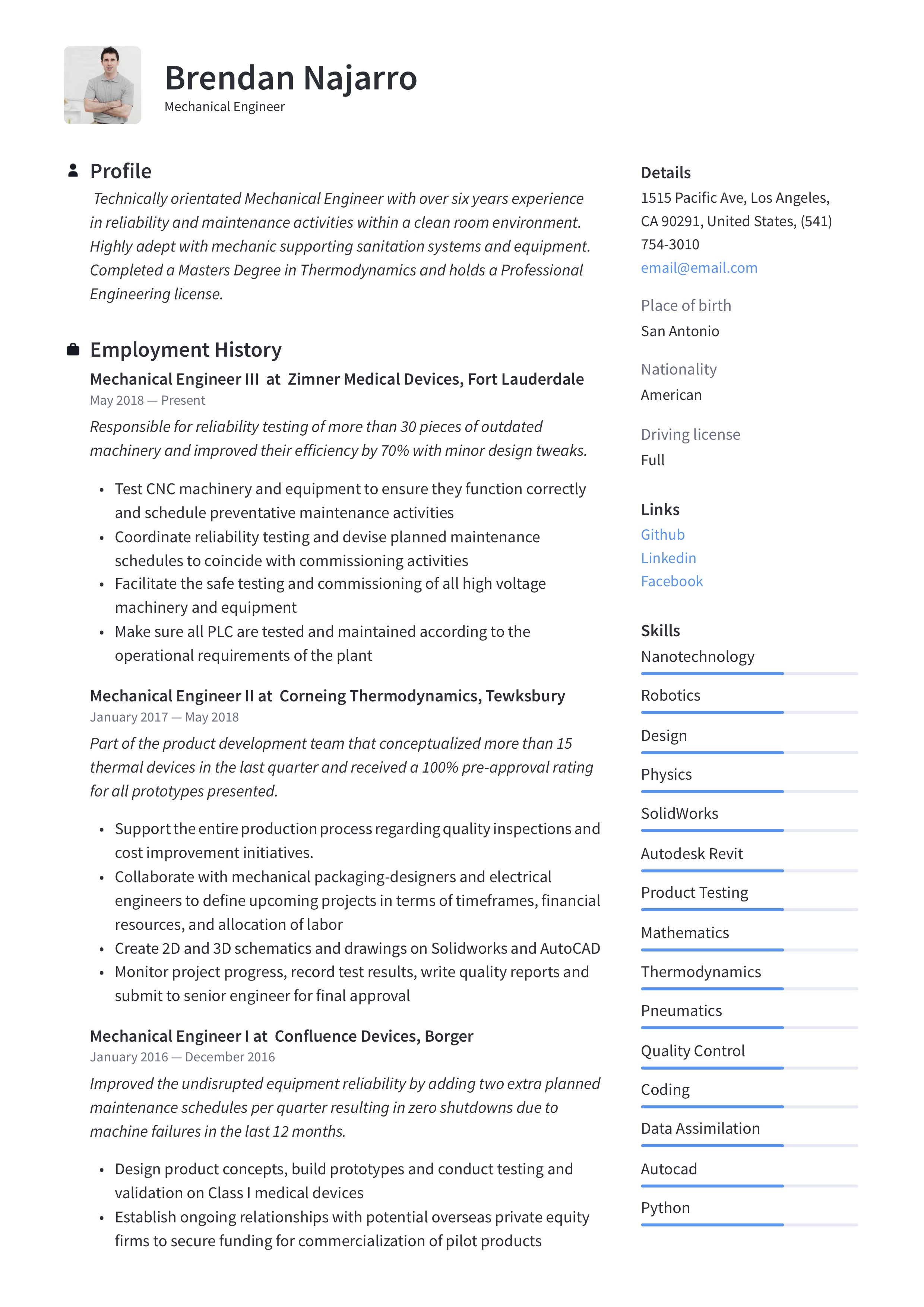
Mechanical Engineer Resume (0).PDF
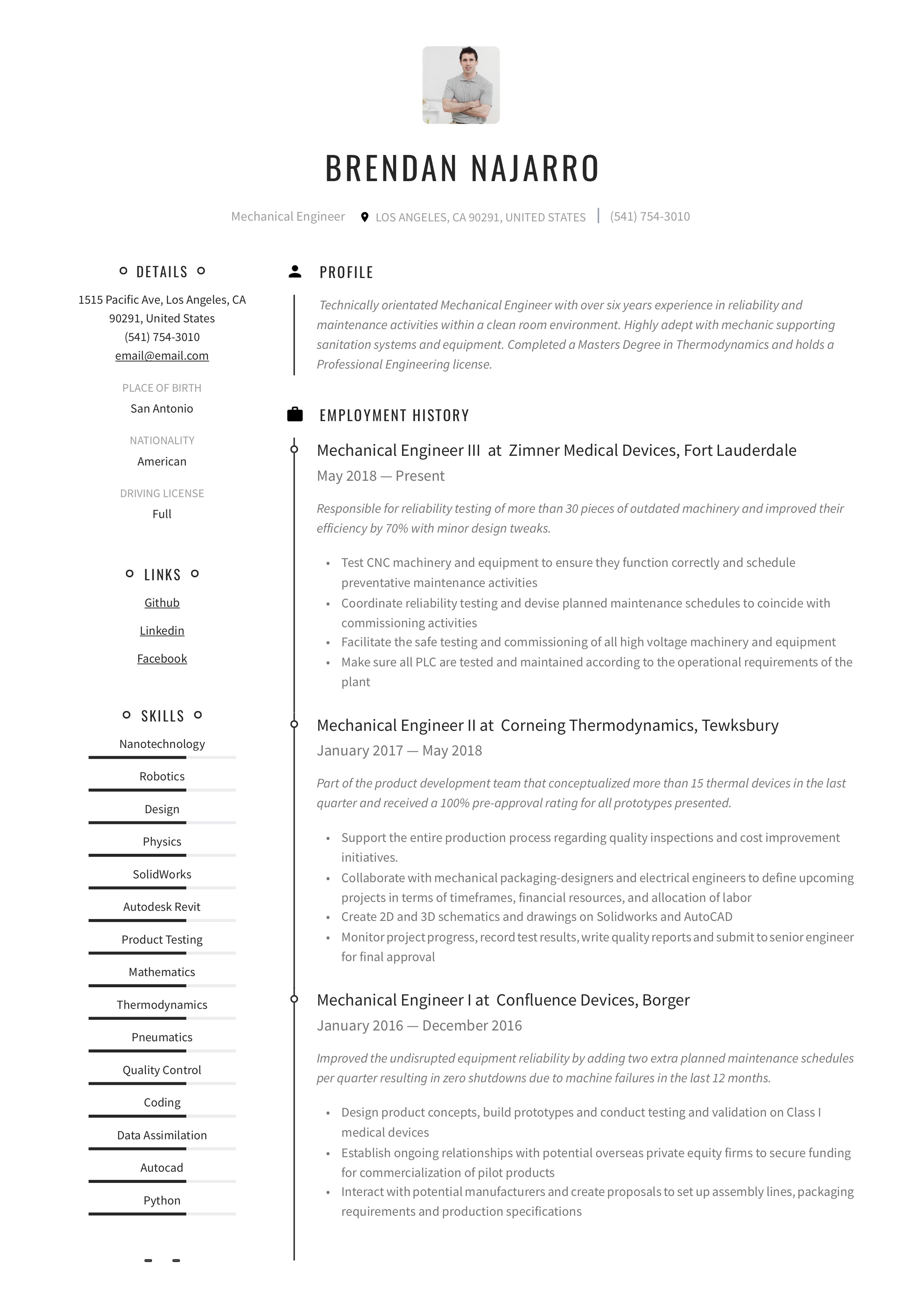
Mechanical Engineer CV (1).PDF
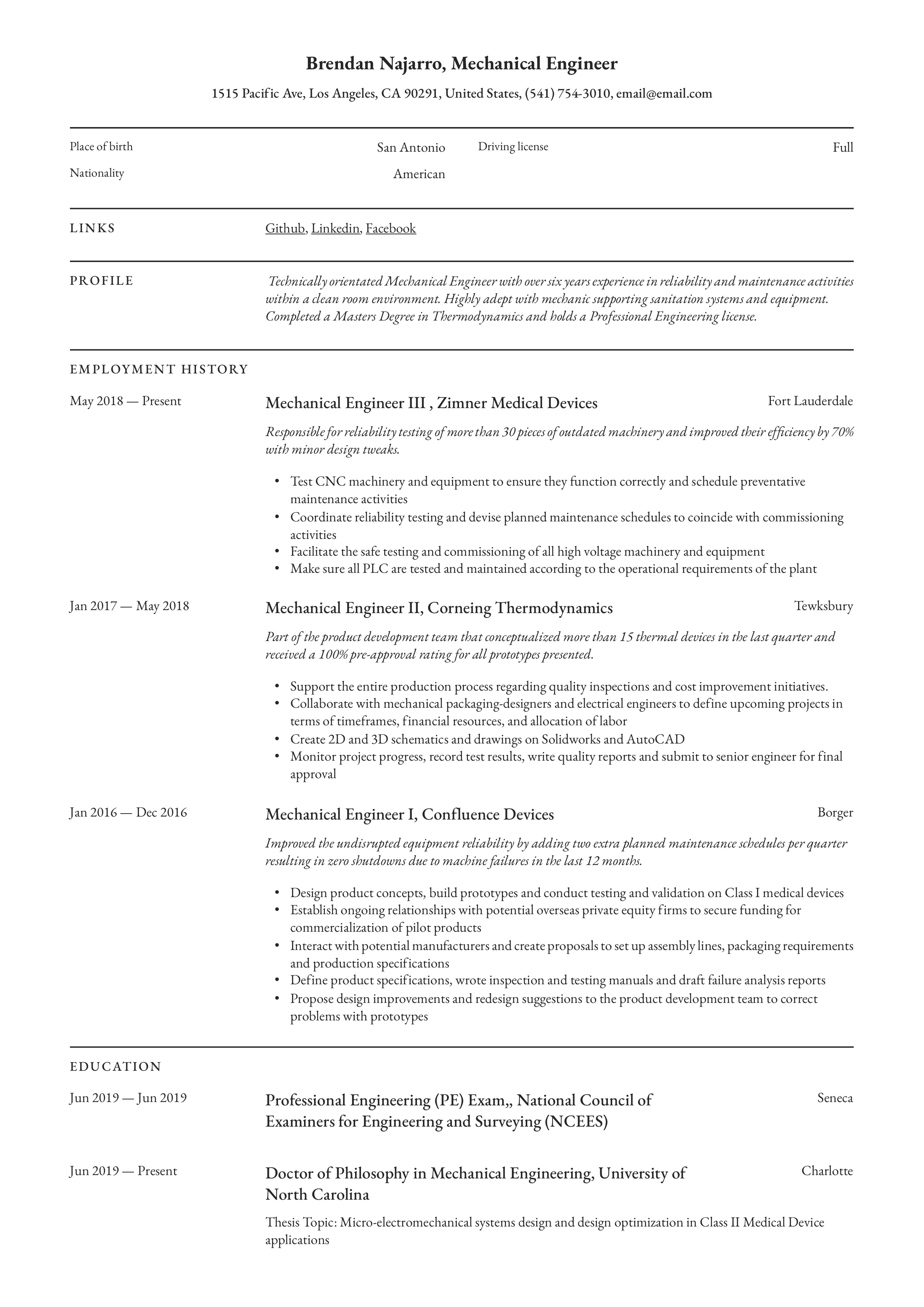
Mechanical Engineer Resume (2).PDF
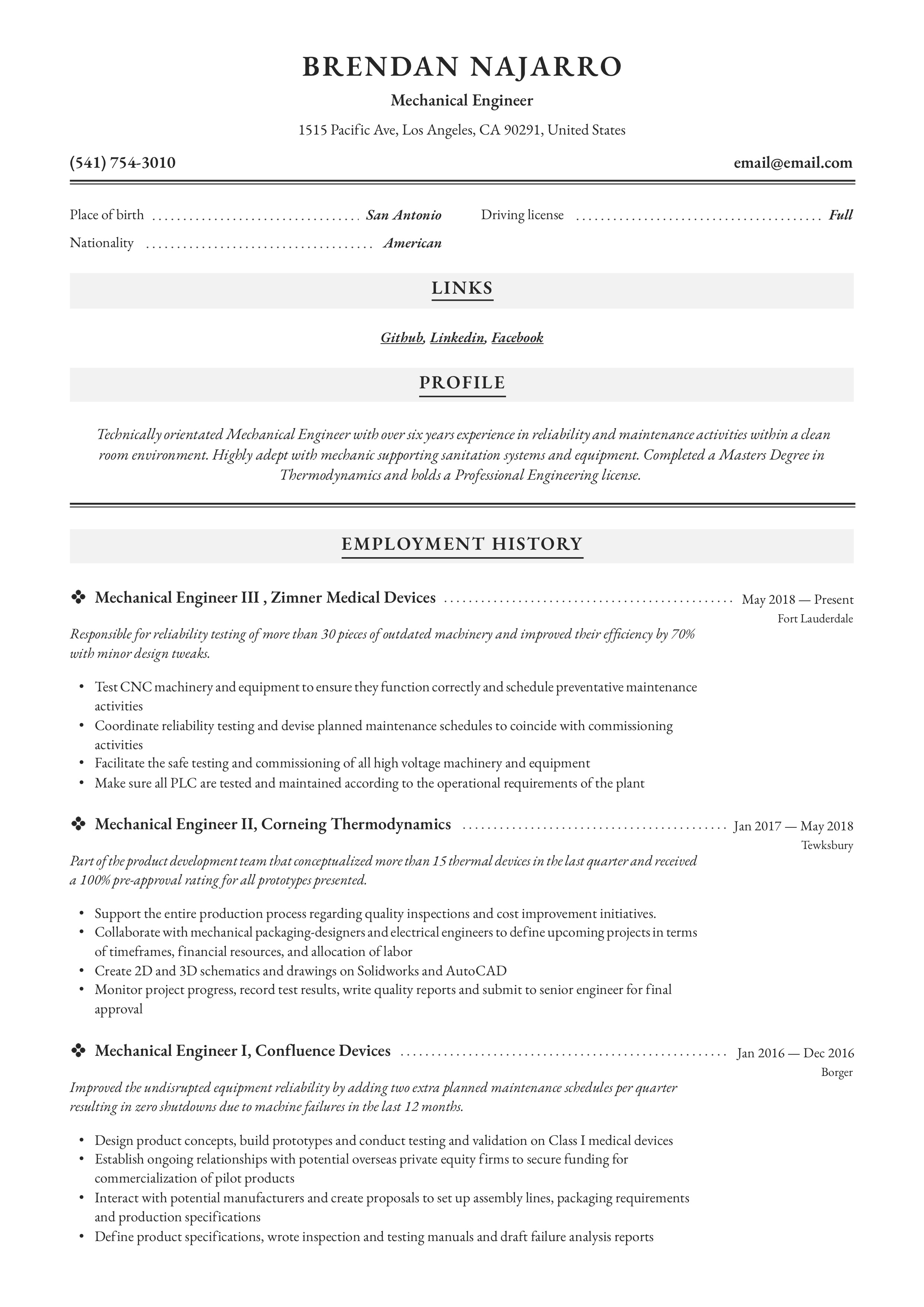
Mechanical Engineer CV (3).PDF
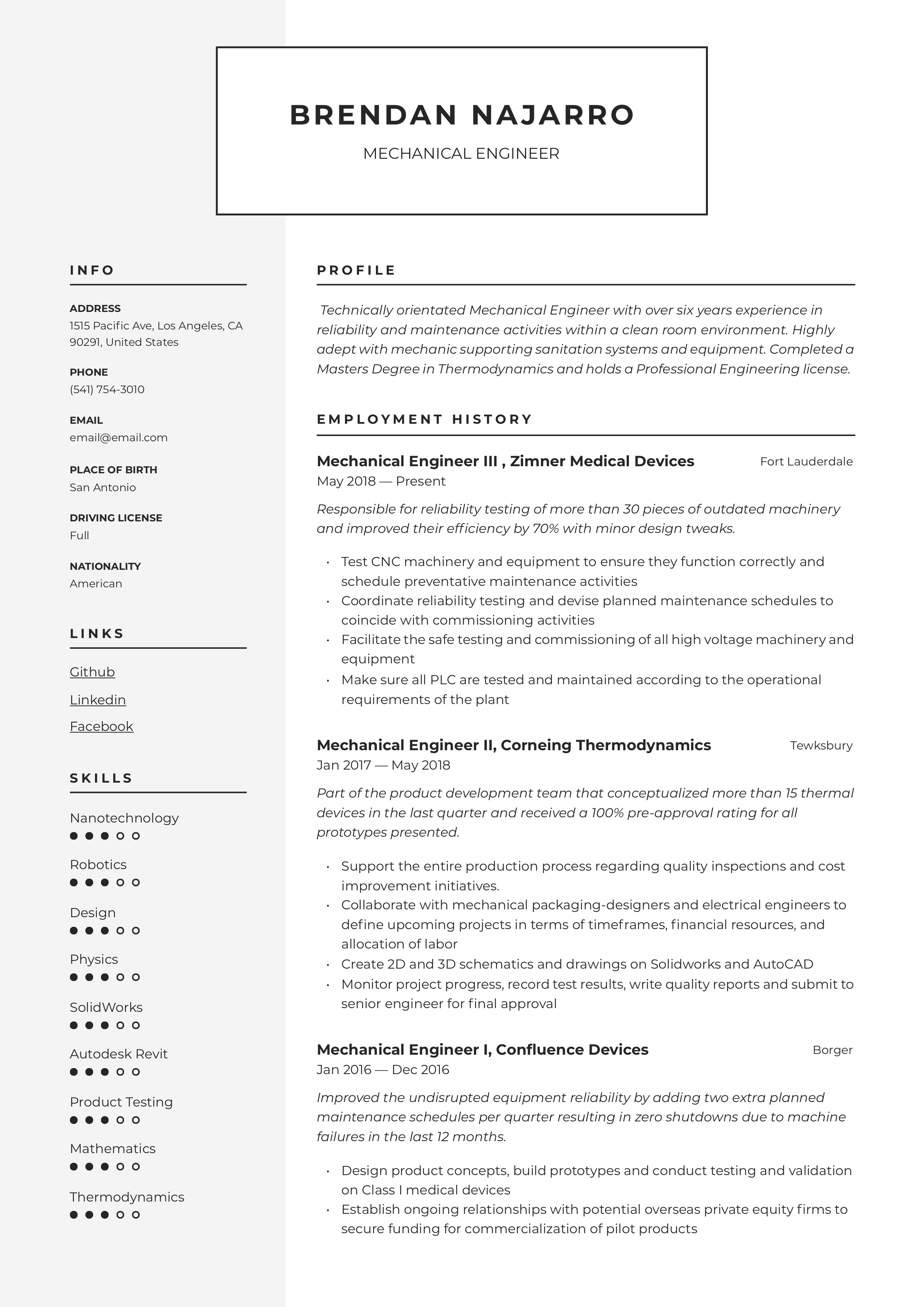
Mechanical Engineer Resume (4).PDF
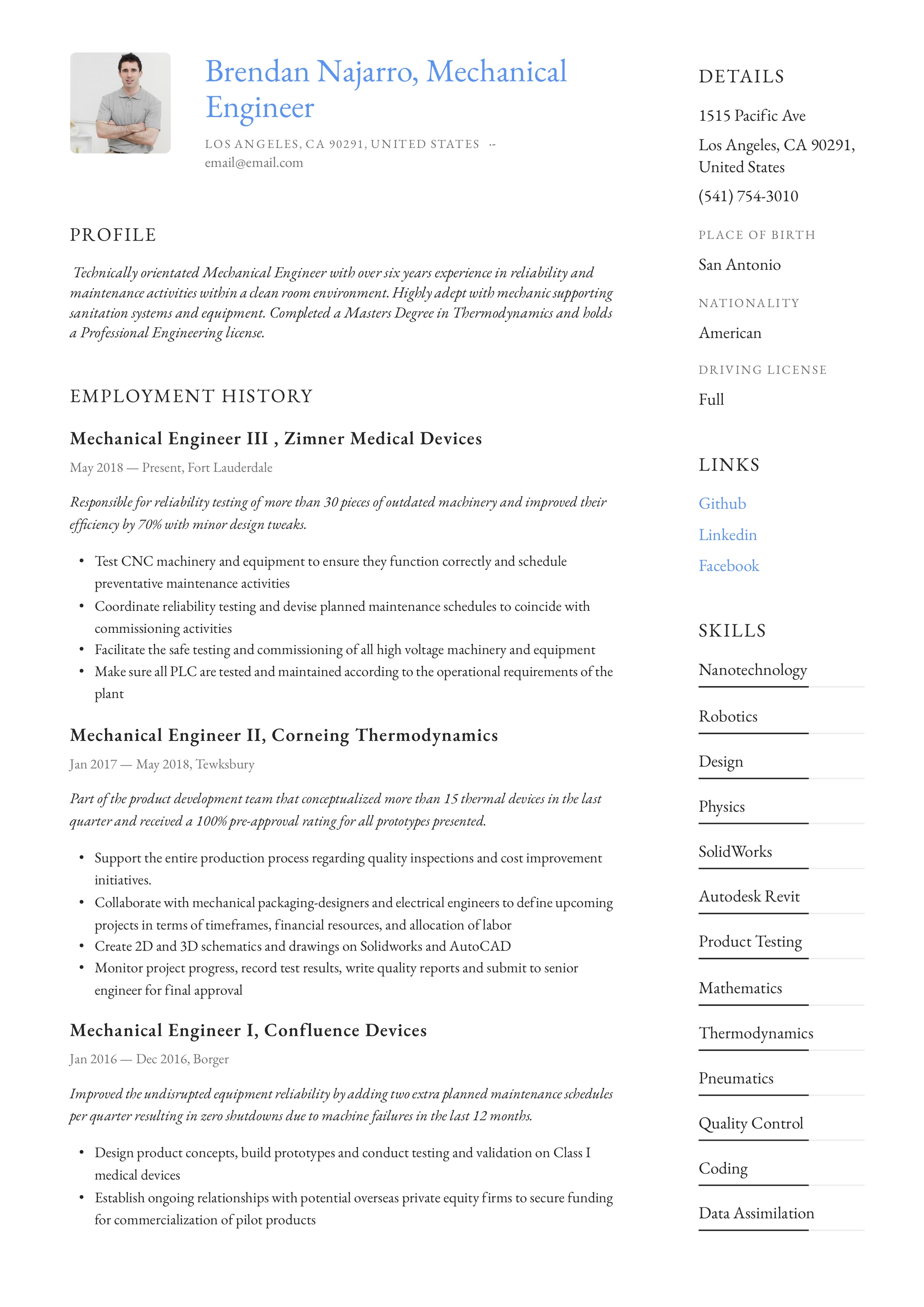
Mechanical Engineer CV (5).PDF
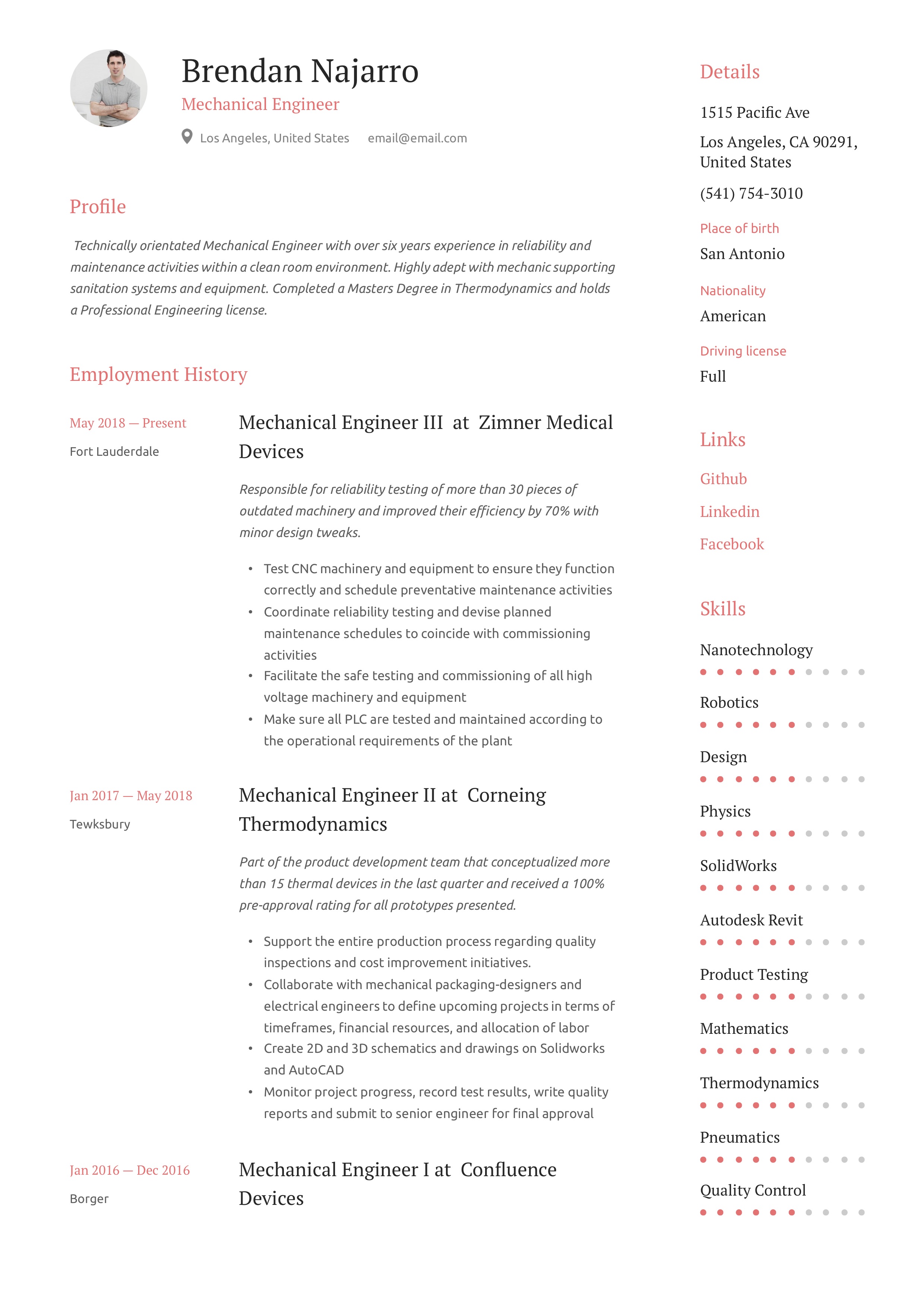
Mechanical Engineer Resume (6).PDF

Mechanical Engineer CV (7).PDF
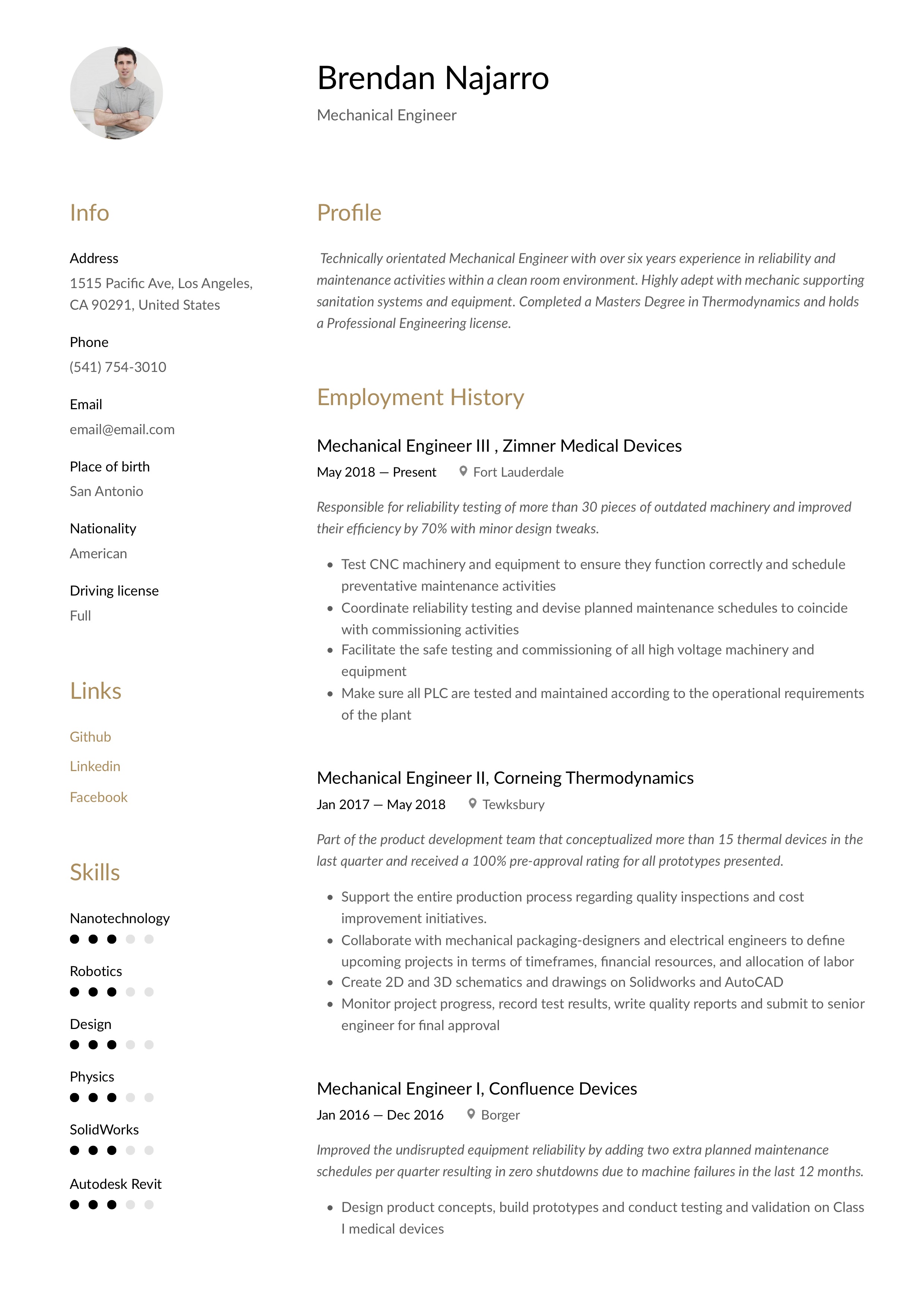
Mechanical Engineer Resume (8).PDF
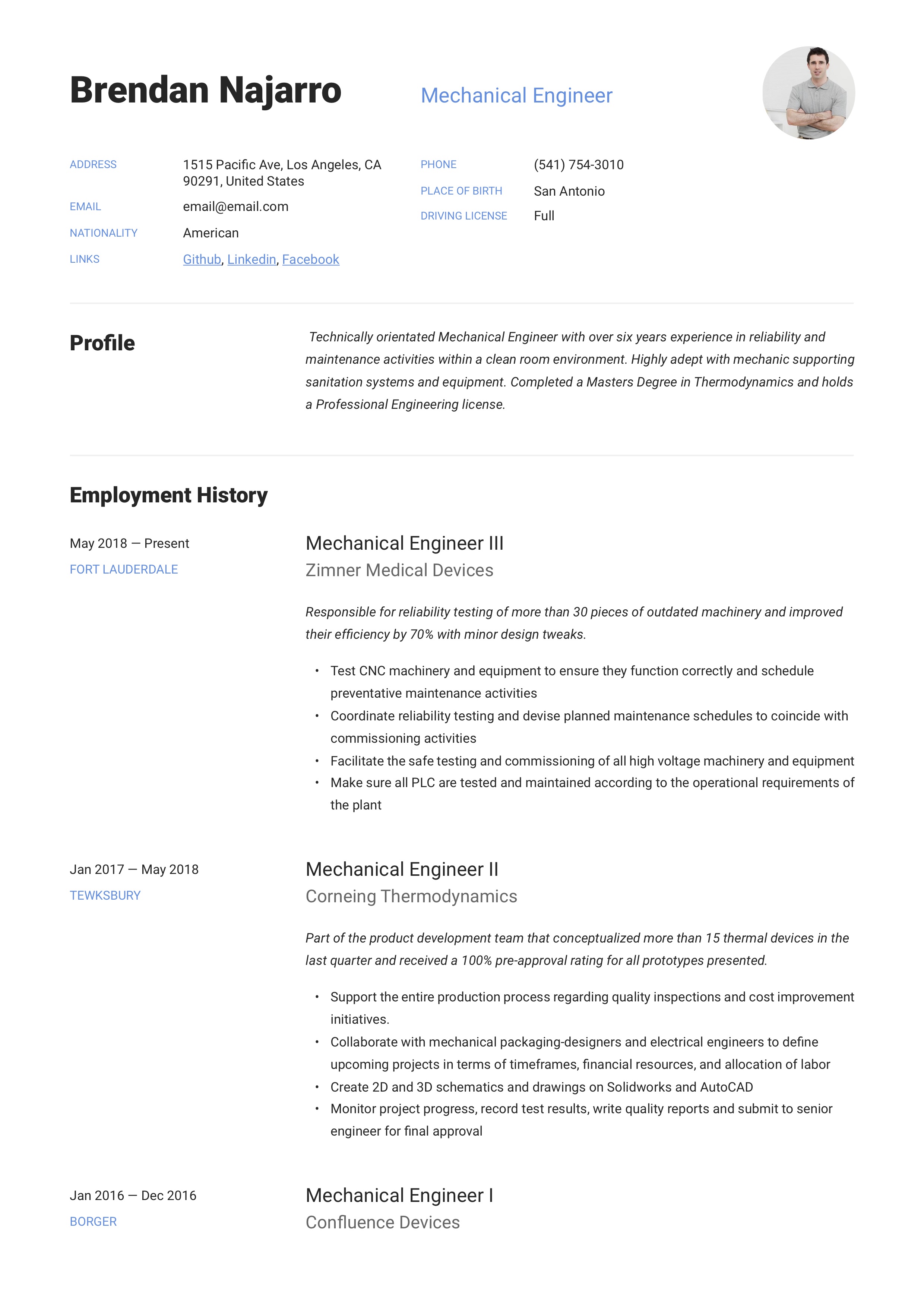
Mechanical Engineer Resume (9).PDF
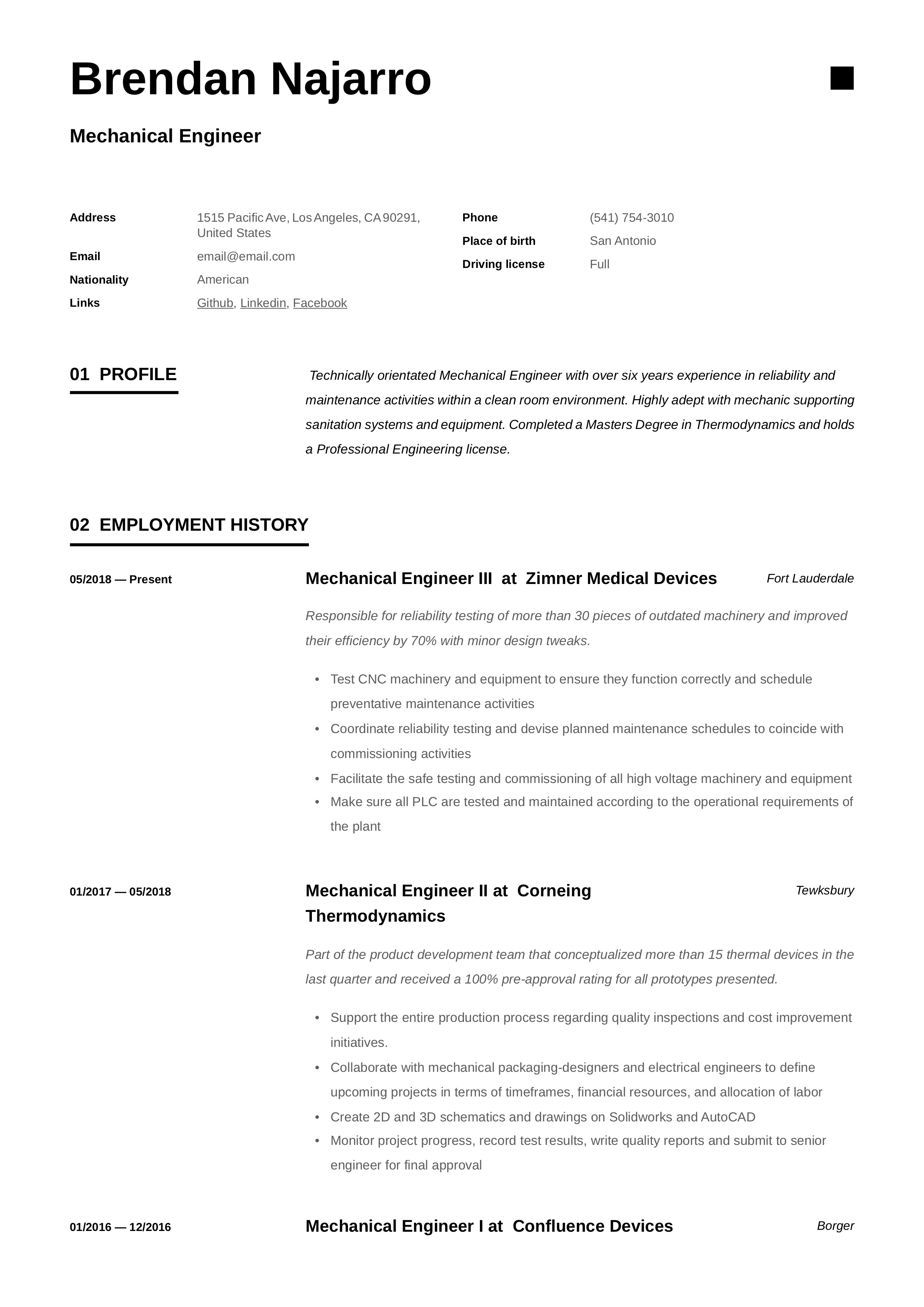
Mechanical Engineer Resume (10).PDF
